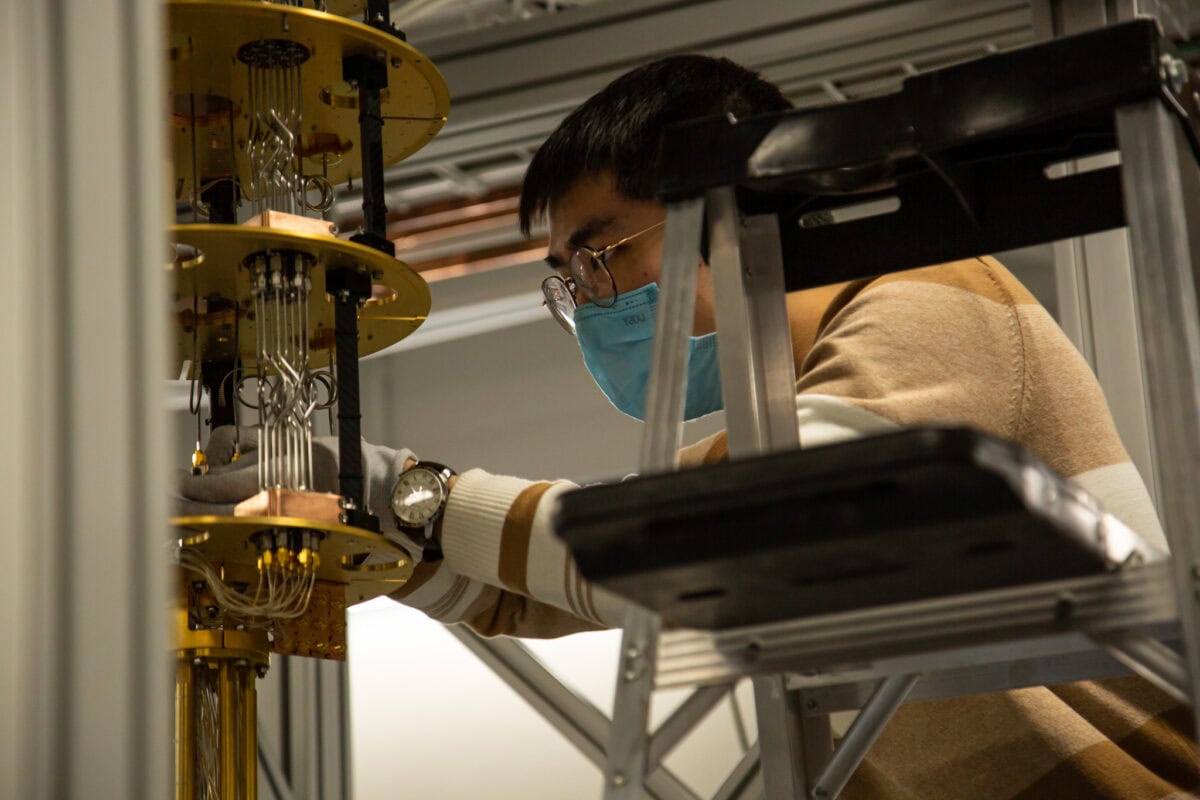
A look at the interior of a dilution refrigerator in the Illinois Quantum Information Science and Technology Center (IQUIST) quantum testbed. Capable of reaching temperatures as low as 0.01 kelvin, this type of cryogenic technology is essential for superconducting quantum computers — similar to the cooling infrastructure planned for the IQMP. Photo courtesy of The Grainger College of Engineering.
Quantum bits, or qubits, are highly sensitive to noise from environmental factors such as heat or electromagnetic radiation as well as inherent noise. This means that they need to be well isolated from their environment in addition to being cooled to extremely low temperatures in order to preserve their quantum state.
Quantum scientists use various techniques to achieve this, including cryogenic cooling systems that operate at temperatures near absolute zero (far colder than outer space), along with other cutting-edge approaches.
Cryo technology will have a home at the Illinois Quantum and Microelectronics Park (IQMP) — enabling companies of all sizes to access an essential resource for research and development.
The IQMP Advantage
Future tenants will be able to access a cryogenic cooling system capable of meeting their diverse needs and, depending on the nature of their technology, providing different temperatures.
Developing and maintaining a cryo system for operation at a specific temperature is cost prohibitive for many small quantum companies. But shared access to cryo facilities at the IQMP will allow companies to scale up faster, with thousands of times more refrigeration power compared to those used to cool small-scale quantum computers now.
“No one’s taken quantum computing, which is currently done at a relatively small scale, and tried to marry it to an industrial tech park where you can provide the massive cooling, space and electricity needed for commercial development,” said Dr. Brian DeMarco, the IQMP’s Chief Technology Officer.
The Phases of Work
The cryo facilities will be brought to life in multiple phases to align with the needs of the tenants as the campus develops.
Phase One is designed to serve the cooling needs of IQMP’s anchor tenant, PsiQuantum — which needs cooling at 4.5K in order to build the first world’s utility-scale, fault-tolerant quantum computer — and the National Quantum Facility (NQF). The NQF has more diverse cooling needs to support a variety of companies and researchers with different approaches.
“Most companies at the NQF will have their own facilities. What they stand to gain is this larger system that would allow them to scale up,” said Dr. Harley Johnson, Executive Director and CEO of the IQMP.
The Setup
Tenants at the Park will be able to enter flexible arrangements tailored to their individual needs. Here’s how it works:
- Each tenant will rent space in the shared facilities and either use their own equipment or equipment lent to them by the IQMP for a fee.
- Each tenant will pay utilities based on their usage, including power, water, helium and nitrogen. Similar to a Homeowners Association (HOA), fees will be assessed to cover unforeseen expenses such as replacing a pipe or tank.
- The IQMP will have on-staff technicians that will help tenants of the NQF with maintenance and operations.
Systems are being designed to minimize environmental impacts. Some cryogenic gases will dissipate into the air, but cryo uses helium and nitrogen, which are both safe, inert gases that exist in the air we breathe everyday. The IQMP will also use a closed loop water cooling system.
“While some heat waste is dissipated during the cooling process, we are designing systems that will make that impact negligible and comparable to the heat dissipated by an air conditioning unit in a downtown office building,” DeMarco said.
The Impact
In the quantum industry, 70 to 75 percent of companies require some version of cryo technology — and the IQMP will be a unique and critical resource for these types of companies.
However, the IQMP is not only meant for tenants who need cryo: its resources and infrastructure are designed to support a diverse range of quantum and enabling technology companies. Johnson said the Park also welcomes tenants who are not quantum computing companies but still use or support quantum, especially in the microelectronics space. Resources like cooling power and helium on site will be a huge benefit for them as well, he added.
“This isn’t just a quantum campus, but a place where groundbreaking research and development across industries will take place,” Johnson said. “If 70 percent of the industry needs cryo, then I hope 70 percent of our tenants use our cryo. I want to serve everyone that needs it.”
Interested in becoming a tenant at the IQMP? Visit Do Business with the IQMP to learn more.
Publish Date
July 17, 2025
Sign Up for Our Newsletter!



